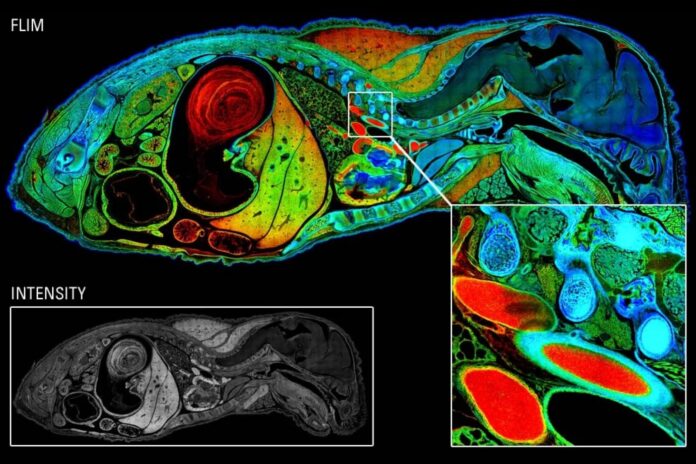Researchers enjoyed an early gift in December when the Fralin Biomedical Research Institute at VTC took delivery of a microscope that can enhance data quality and precision. The FLIM-FRET fast imaging system (fluorescence lifetime microscopy and Förster’s resonance energy transfer) will enable researchers to better analyze the structure and function of complex biological systems.
Fluorescent molecules are essential tools for cell biologists, and most imaging experiments measure the intensity of fluorescent dyes to produce an image. This imaging technology uses another key property of fluorescence — its lifetime, which reflects how long the dye stays in the excited state. The contrast of an image is dependent on the lifetime, not the intensity, of the fluorescence signal.
The microscope’s capabilities apply to a number of the institute’s research areas. In neuroscience, for instance, the tool can help investigators map brain functions and track signaling pathways through the use of light. It has been used to deepen scientists’ understanding of how neurons contribute to decision-making, learning, feeding, addiction, and behavior.
The new system has an integrated module called FALCON, fast lifetime contrast, for functional imaging. FALCON — combined in-line with confocal — will allow researchers access to video-rate fluorescence lifetime acquisition for rapid kinetic studies in live cells.
“The Leica Stellaris will enhance our ability to show how cells grow, change, and interact with each other as they live, develop, and respond to disease,” said Christie Lacy, a senior research associate who manages the cellular and molecular imaging core at the institute. “We will be able to see how proteins interact with each other as well as behave within cells and between cells during cell-to-cell communication.”
Lacy said the equipment will allow researchers in neuroscience, cardiovascular research, and cancer research to gain a greater understanding of such interactions and how they affect human development and disease.
The equipment will be part of the core services available to researchers at the Fralin Biomedical Research Institute, Virginia Tech, and the wider community of health scholars.
The acquisition was made possible by a $1 million grant through the Health Resources and Service Administration, whose programs include support of health infrastructure. The agency, part of the U.S. Department of Health and Human Services, serves communities that are geographically isolated and economically or medically vulnerable.
“This next generation instrumentation will greatly enhance the ability of multiple research teams at the institute and across the Virginia Tech campus,” said Michael Friedlander, the grant’s principal investigator. Friedlander is vice president for health sciences and technology and executive director of the Fralin Biomedical Research Institute. “It will allow us to carry out functional visualization of biological processes at a level not heretofore possible, coupled with our other high resolution imaging systems that operate across a wide range of spatial scales.”
The research institute’s location — most scientists at the Fralin Biomedical Research Institute are based in Roanoke — enables better access to populations underserved in biomedical research.
At the same time, the institute’s relationships with Carilion Clinic and Children’s National Hospital in Washington, D.C., encourage clinical research, further positioning it to lead faculty engagement across disciplines, including engineering, science, medicine, agriculture and life sciences, and veterinary medicine.

